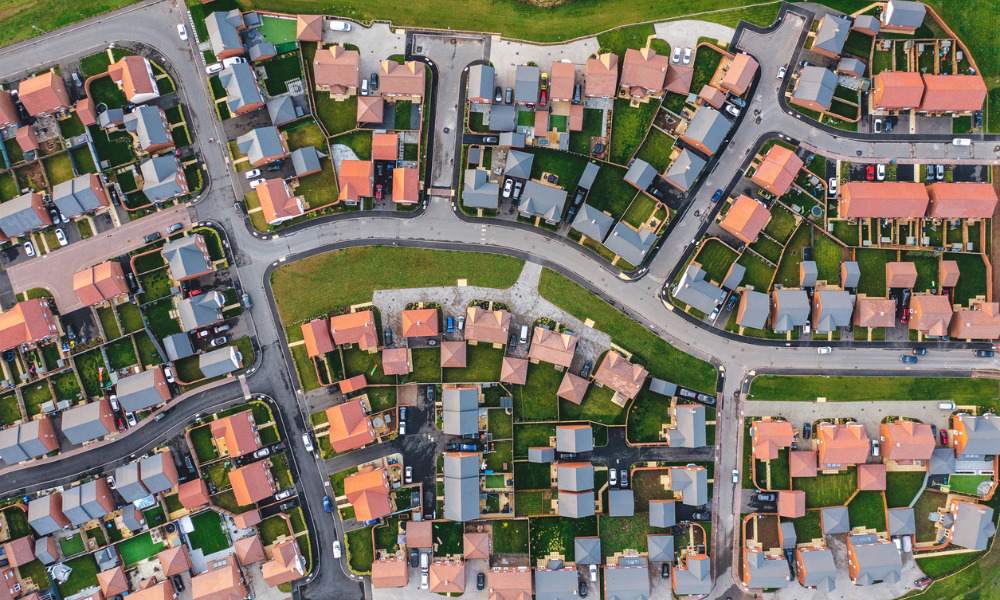Data shows a resilient housing market with small house price falls

The average price of a UK home was £285,044 in July, down by 0.3% compared with the previous month, according to mortgage lender Halifax.
This is the fourth consecutive monthly fall of house prices recorded by Halifax. However, the month-on-month decreases have all been smaller than 0.5%. In fact, prices are little changed over the last six months, with the typical property costing £285,660 in February.
According to the latest Halifax House Price Index, the pace of annual price decline also slowed to 2.4% in July, compared with 2.6% in June.
These figures, Kim Kinnaird, director at Halifax Mortgages noted, add to the sense of a housing market which “continues to display a degree of resilience in the face of tough economic headwinds.”
“In particular, we’re seeing activity among first-time buyers hold up relatively well, with indications some are now searching for smaller homes, to offset higher borrowing costs,” Kinnaird said.
“Conversely, the buy-to-let sector appears to be under some pressure, though elevated interest rates are just one factor impacting landlords’ business models, together with considerations of future rental market reforms. It remains to be seen how many may choose to exit and what that could mean for the supply of properties available to buy.”
Kinnaird also pointed out that prospects for the UK housing market remain closely linked to the performance of the wider economy.
“Several factors are providing support, notably strong wage growth, running at around +7% annually,” she said. “And, while the uptick in unemployment is likely to restrain that somewhat, it seems unlikely to reach levels that would trigger a sharp deterioration in conditions.
“Expectations of further base rate increases from the Bank of England were tempered by a better-than-expected inflation report for June. However, while there have been recent signs of borrowing costs stabilising or even falling, they will likely remain much higher than homeowners have become used to over the last decade.”
Kinnaird added that the continued affordability squeeze would mean constrained market activity persists, and that they expect house prices to continue to fall into next year.
“Based on our current economic assumptions, we anticipate that being a gradual rather than a precipitous decline,” she said. “And one that is unlikely to fully reverse the house price growth recorded over recent years, with average property prices still some £45,000 or 19% above pre-COVID levels.”
James Briggs, head of personal finance intermediary sales at Together, commented that while house prices may have continued a downward trajectory, affordability is still putting pressure on existing homeowners.
“Those with recently expired fixed rates are now being forced to reconsider perhaps less desirable strategies to balance their household expenditure, including downsizing sooner than hoped,” he said.
“Over the past two weeks, there has also been a downward trend of fixed rate residential mortgage rates as the swap market pricing has cooled, making these more accessible compared with recent months. This change, coupled with a downsizing appetite, will increase competition for sub-£300,000 properties and first-time buyers looking to enter the market in the near future.
“And yet, there is still caution around further rate rises, which is fueling hesitation among potential buyers. The time to market properties is being dragged out past expectation, which in turn is driving vendors to accept much lower offers, further impacting on comparable values for mortgage purposes.”
For Iain McKenzie, chief executive at The Guild of Property Professionals, the affordability factor is still weighing on the minds of most buyers, particularly for first-time buyers that may be seeing their deposit not go as far.
“This squeeze will undoubtedly have an impact on sales, and we are anticipating a fall of around 20% by the end of the year,” McKenzie said. “Tackling inflation is the number one priority, followed by committing to building homes which are truly affordable. This will ensure that more buyers are able to get their foot on the property ladder.”
Any thoughts on the findings of the latest Halifax House Price Index? Let us know by leaving a comment in the discussion box at the bottom of the page.



